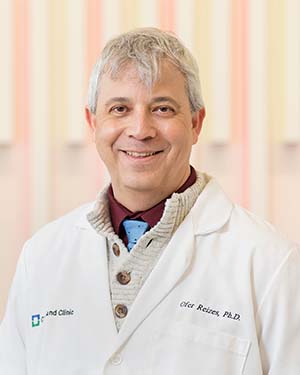Research News
11/07/2022
Restoring the gut biome after antibiotics could lead to better outcomes for ovarian cancer patients
Reassessing antibiotic dosage and type could improve survival rates in deadliest gynecologic malignancy, Cleveland Clinic research finds.

Antibiotics routinely used in ovarian cancer care indiscriminately kill gut bacteria, leading to faster cancer progression and lower survival rates, according to recent Cleveland Clinic research.
The results, published in Cancer Research, challenge the standard of care for ovarian cancer, the deadliest gynecologic malignancy. Antibiotics are essential to treating bacterial infections during cancer treatment, but kill bacteria that may be essential for patients with ovarian cancer to respond to chemotherapy.
Selecting antibiotics or dosages proven to preserve more of the microbiome, the trillions of bacteria that live in the gut, could preserve the balance of gut bacteria and prevent tumor progression or treatment resistance, says Ofer Reizes, PhD, Department of Cardiovascular & Metabolic Sciences and lead investigator on the study.
The research digs deeper into findings published by Cleveland Clinic Women’s Institute of Health in Gynecological Oncology that observed lower survival rates in patients with ovarian cancer treated with antibiotics. Although most ovarian cancer patients respond to chemotherapy, tumors recur in over 80% of patients leading to a survival rate of less than 5 years.
Collaborating to look at this problem through the microbiome can help explain why some patients are initially resistant to chemotherapy, and continue to guide antibiotics in clinical practice, says Chad Michener, MD, Vice Chair for Ob/Gyn & Women's Health Institute.
Dr. Reizes’ team saw the association investigated in preclinical models and found increased tumor growth, reduced response to chemotherapy and decreased survival after introducing antibiotics. The investigative team, including members of the Center for Microbiome and Human Health, focused on the gut microbiome and performed additional studies to show that reintroducing healthy bacteria into the gut is sufficient to slow down ovarian cancer growth and restore tumor sensitivity to chemotherapy.
“The current findings indicate that we shouldn’t throw the kitchen sink of antibiotics at patients,” Dr. Reizes says. “Antibiotics are crucial for patient care, but we need to consider and address the long-term effects on the body.”
Physicians need to be “good stewards” for antibiotics use, Dr. Michener says, with this study providing further evidence to support selecting targeted, short-term antibiotics to treat infections and considering when antibiotics for prophylaxis are necessary. Overprescribing antibiotics is already a concern for infectious disease teams because it can lead to development of antibiotic resistant bacteria, he says.
The study also serves as a starting point for research on how to most effectively rebuild gut colonies. Some patients might benefit from reintroduction of bacteria through procedures like fecal transplants, while others could rebalance their gut through specific types of probiotics or diet changes.
“Maybe it’s as simple as giving probiotics when people have cleared their infection, but it may be more in-depth than that,” Dr. Michener says.
Dr. Reizes, the Laura J. Fogarty Endowed Chair for Uterine Cancer Research, says that the team is currently working on whether introducing specific metabolites produced by the bacteria, identified in the study, could be used to restore that balance. This study highlighted two potential metabolites that could play a role in sensitivity to treatment and suppressing tumor growth: Indole-3-propionic acid and indoxyl sulfate.
The paper includes researchers from the Center for Microbiome and Human Health, Taussig Cancer and the Women’s Health Institutes, and is the result of research initiated as part of the Cleveland Clinic Center of Research Excellence in Gynecologic Cancer. Established in 2018 through Cleveland Clinic internal funding, the center of excellence seeks to develop strategies for overcoming chemotherapy treatment resistance.
The Reizes Lab is funded by the Center of Research Excellence, VeloSano Bike to Cure, National Cancer Institute, and the Department of Defense.
Featured Experts
News Category
Related News
Research areas
Want To Support Ground-Breaking Research at Cleveland Clinic?
Discover how you can help Cleveland Clinic save lives and continue to lead the transformation of healthcare.
Give to Cleveland Clinic